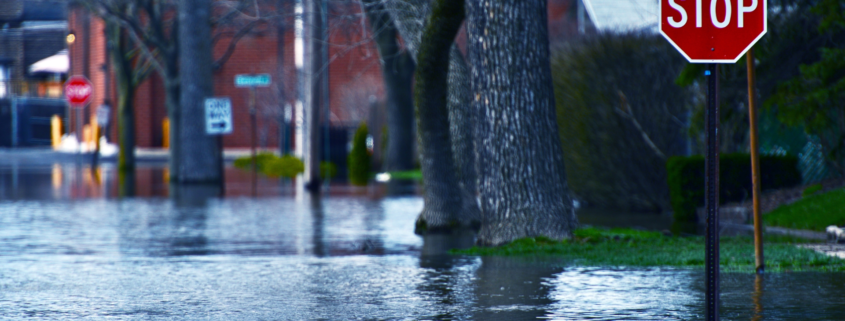Florida may be the Sunshine State, but in recent years, Central Florida has experienced more frequent and severe flooding than ever before. Heavy summer storms and unpredictable weather patterns have left neighborhoods dealing with standing water, property damage, and costly repairs.
Now, beginning October 1, 2025, the state is taking a major step toward transparency. Under Florida Statute §83.512—created through Senate Bill 948 (2025)—landlords and property managers must disclose any known history of flooding or flood-related damage before signing certain residential leases.
The goal is simple: tenants should understand flood risks before moving in.
But for landlords, this new requirement adds a serious layer of legal responsibility, and ignoring it could mean refunds, terminated leases, or legal disputes.
Below, we’ll break down what the new law requires, who it affects, and why even landlords with no flood history should prepare now.
What Does the New Florida Flood Disclosure Law Require?
Beginning October 1, 2025, landlords and property managers must provide a separate written flood disclosure before signing any residential lease lasting one year or longer.
This disclosure cannot be buried in the lease, it must be a standalone document following a specific statutory format.
The disclosure must state whether:
- You know of any flooding that has damaged the dwelling during your ownership.
- You have ever filed a flood-related insurance claim (including with the National Flood Insurance Program, or NFIP).
- You have ever received assistance for flood damage, such as aid from FEMA or another recovery program.
Even if the property has never flooded, the form must still be completed, signed, and given to the tenant before or at the time of lease signing.
What Counts as “Flooding” Under the Law?
The statute defines “flooding” broadly, it’s not just catastrophic storms. It includes:
- Overflow of inland or tidal waters
- Unusual or rapid accumulation of surface water (such as heavy rain or drainage backups)
- Sustained standing water caused by rainfall
That means even moderate or isolated flooding events could trigger the disclosure requirement if they damaged the dwelling.
What Happens If You Don’t Disclose Flood History?
Failing to provide the required flood disclosure isn’t just a paperwork mistake, it can have costly consequences.
Under §83.512, if a tenant suffers substantial loss or damage to their personal property because of flooding, and the landlord never provided the disclosure, the tenant gains significant rights.
Possible outcomes include:
- Early lease termination: The tenant can terminate the lease by giving written notice within 30 days of the loss and surrendering the property.
- Refunds of prepaid rent and deposits: The landlord must refund all rent or other amounts paid in advance for any period after the termination date.
- Potential legal disputes: Landlords who fail to disclose can face claims of misrepresentation, negligence, or breach of the duty to maintain habitable conditions.
- Loss of documentation defense: The signed disclosure form is your proof of transparency. Without it, it becomes your word against the tenant’s.
Tip: Compliance is your best protection.
Providing the disclosure takes just minutes, and costs far less than refunding months of rent or defending a lawsuit.
If you’re unsure whether your lease packet meets the new standards, The Orlando Law Group can review and update your documents before the October 2025 deadline.
Call 407-565-HELP or visit TheOrlandoLawGroup.com.
Does the Law Apply to Month-to-Month or Short-Term Leases?
Technically, Florida’s new Flood Disclosure Law only applies to leases of one year or longer.
Month-to-month or shorter agreements aren’t legally required to include a flood disclosure form.
However, voluntary disclosure is still smart risk management.
Even without this statute, tenants who experience flooding can claim that you failed to disclose known risks or misrepresented the property’s condition, potentially leading to:
- Negligence or misrepresentation claims
- Breach of implied warranty of habitability
- Constructive eviction (tenants leaving and stopping rent payments because the unit became unlivable)
By voluntarily giving a disclosure, you:
- Demonstrate transparency about the property’s history
- Encourage renters to consider flood insurance
- Show good-faith compliance with the intent of the law
In short, providing a flood disclosure, whether required or not, protects you.
It’s one extra page that could prevent a lawsuit later.
The Bottom Line
Florida’s 2025 Flood Disclosure Law is designed to protect tenants, but it also gives responsible landlords a way to build trust and avoid legal trouble.
Whether your property has flooded or not, review your leases now to ensure compliance.
For legal guidance on Florida landlord laws, disclosures, or lease compliance, contact The Orlando Law Group today.
We serve Orlando, Waterford Lakes, Altamonte Springs, Winter Garden, Lake Nona, St. Cloud, Kissimmee, and throughout Central Florida.
Call 407-565-HELP or visit our Contact Us page today.
Last Updated on October 20, 2025 by The Orlando Law Group




